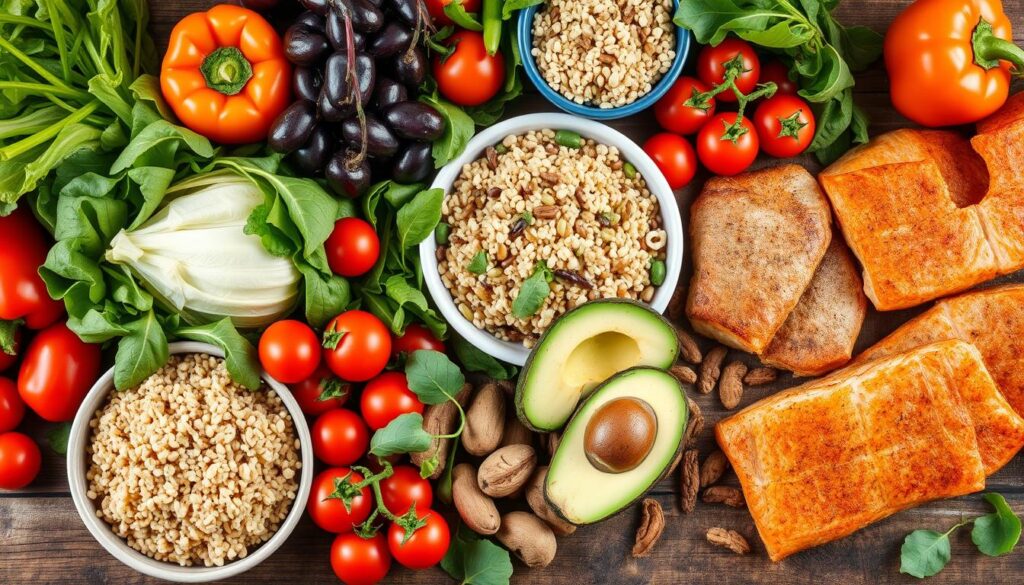How to Start Diet Without Feeling Overwhelmed
Table of Contents
Starting a weight loss journey can seem like a big challenge. Every year, millions of people try to lose weight but often get frustrated. The good news is, you don’t have to make huge changes or punish yourself.
A study from 2022 shows that most people who diet end up gaining back the weight. This isn’t because they failed, but because losing weight is hard. The secret to success is seeing your diet as a long-term change, not a quick fix.
Start Diet your healthy eating journey is about being kind to yourself and planning wisely. By making small, steady changes, you can make lasting improvements. This way, you can reach your wellness goals without feeling overwhelmed.
Key Takeaways
- Understand that weight loss is a gradual process
- Focus on sustainable lifestyle changes
- Embrace small, consistent dietary improvements
- Prioritize nutrition over restrictive dieting
- Develop a positive mindset toward healthy eating
Understanding the Fundamentals of Healthy Eating
Starting a good nutrition plan means knowing the basics of clean eating. Your diet is more than food; it’s a way to stay healthy and feel good. Studies show that eating whole, nutrient-rich foods can lower disease risks and boost health.
What Makes a Diet Balanced and Sustainable
A balanced diet isn’t about strict rules. It’s about making smart, regular choices. Important parts include:
- Diverse nutrient intake
- Balanced macronutrients
- Consistent eating patterns
- Enjoyable and flexible meal options
Key Nutrients Your Body Needs
Your body needs a variety of nutrients to work well. Here’s a list of important ones:
| Nutrient Category | Key Sources | Health Benefits |
|---|---|---|
| Proteins | Eggs, lean meats, legumes | Muscle repair, immune function |
| Complex Carbohydrates | Whole grains, vegetables | Energy, fiber, sustained nutrition |
| Healthy Fats | Avocados, nuts, olive oil | Brain health, hormone regulation |
The Role of Portion Control
Controlling portions is key to a healthy diet. Visual cues can help: a meat serving should be like a deck of cards, and starchy foods like a light bulb. This helps avoid overeating and ensures you get the nutrients you need.
Remember, a good nutrition plan isn’t about being perfect. It’s about making regular, thoughtful choices that help your health in the long run.
To get better results, you can benefit from the benefits of this nutritional supplement
Why Most Start Diet Fail and How to Avoid Common Pitfalls
Trying to follow diet programs can be like walking through a minefield. About 95% of people who lose weight gain it back within one to five years. This shows we need a better way to manage our weight.
First, we must understand why diets often fail. Many people make mistakes that stop them from losing weight:
- Setting unrealistic expectations
- Choosing overly restrictive eating plans
- Neglecting psychological factors
- Treating dieting as a temporary solution
Your journey should aim for lasting changes. Research shows 60% of people see dieting as a short-term fix. This mindset leads to failure. Instead, focus on these strategies:
- Develop a holistic approach to health
- Address emotional eating patterns
- Create realistic, achievable goals
- Focus on long-term wellness
Emotional eating affects about 75% of those trying to manage their weight. This can ruin even the best diet plans. Getting help from professionals can help 40% of people overcome these challenges.
True success comes from transforming your entire approach to nutrition and wellness, not just following a temporary diet plan.
Remember, a lifestyle change is about making lasting habits. By avoiding common mistakes, you can take a better path to health.
The Psychology of Starting a New Diet
Starting a weight loss journey is more than just changing your diet. It’s a big change in your lifestyle. This change needs you to understand the mental reasons behind your eating habits. Many people find it hard to stick to diets because of mental barriers, not just food choices.
Managing Emotional Eating Triggers
Emotional eating is a big challenge for many trying to lose weight. Studies show that about 40% of dieters feel guilty or ashamed about their food choices. Your feelings about food often come from deeper psychological patterns:
- Stress-induced eating
- Boredom-driven consumption
- Anxiety-related food cravings
Building a Positive Mindset for Success
Changing how you think about diet and nutrition can help a lot. By spotting negative thoughts like “I can’t do this”, you can switch to positive ones that help you reach your weight loss goals.
| Negative Thought | Positive Reframe |
|---|---|
| “Diets never work for me” | “I am learning healthier habits” |
| “I always fail” | “Each attempt teaches me something new” |
Setting Realistic Expectations
Only 20% of dieters look for evidence-based advice, leading to unrealistic hopes. A lasting lifestyle change is about slow, steady progress, not quick fixes. Also, 65% of people working with health experts say they do better at losing weight.
“Your mindset determines your success more than any diet plan.”
How to Start a Diet Without Overwhelming Yourself

Starting a diet doesn’t have to be scary. The secret is to make small, lasting changes. Instead of big changes, focus on gradual steps. This builds confidence and creates habits that last.
Here are some tips to start a diet without feeling stressed:
- Start by eating smaller portions, not cutting out foods
- Add one healthy habit each week
- Use simple tools or apps to track your progress
- Set achievable goals for each week
Studies say losing 5% to 10% of your body weight can really help your health. For example, someone who weighs 180 pounds could aim to lose 9 to 18 pounds over a few months. This slow, steady approach is better than quick, extreme diets.
Small, consistent changes create lasting results.
Creating a calorie deficit doesn’t mean you have to cut out all your favorite foods. Instead, focus on eating foods that are full of nutrients and keep you full. Keeping a food journal can boost your motivation and help you stay on track. Research shows that people who track their food are more likely to lose weight and keep it off.
Remember, it’s about making progress, not being perfect. Talking to a healthcare professional can give you advice that fits your health needs and weight loss goals.
Creating a Sustainable Meal Planning Strategy
Meal planning makes healthy eating easier. It turns a hard task into a simple part of your life. You’ll feel less stressed about what to eat every day.
To plan meals well, know what you need nutritionally. Then, make a system that fits your life. The aim is to enjoy eating healthy without effort.
Weekly Meal Prep Basics
Good meal prep begins with knowing your nutritional needs. Here are some key tips:
- Choose a consistent prep day (usually Sunday)
- Invest in quality storage containers
- Plan meals that can be easily batch-cooked
- Rotate protein sources for variety
Shopping List Essentials
A good shopping list is key for meal planning. Look for foods that are full of nutrients and help you reach your health goals.
| Category | Recommended Items |
|---|---|
| Proteins | Chicken, tofu, eggs, lean beef |
| Vegetables | Spinach, broccoli, carrots, bell peppers |
| Grains | Quinoa, brown rice, whole wheat pasta |
| Healthy Fats | Avocado, olive oil, nuts, seeds |
Time-Saving Preparation Tips
Make meal planning quicker with these tips:
- Develop a master menu with flexible recipes
- Keep 3-4 pantry meals ready for busy weeks
- Use meal prep containers for easy portioning
- Prep ingredients in bulk during free time
By using these strategies, you’ll make healthy eating a part of your life that’s easy and natural.
Making Smart Food Choices and Substitutions

Smart food choices are key to a good nutrition plan. Many Americans don’t eat enough veggies and fruits. Learning to swap foods can help you eat healthier.
Start your clean eating journey with simple swaps. These changes boost nutrition and cut down on processed foods. Here are some good swaps:
- Swap fried chips for baked corn tortilla chips
- Replace cream-based soups with vegetable broth-based options
- Choose whole-wheat bread instead of white bread
- Select grilled chicken over fried chicken
The MyPlate model suggests filling half your plate with fruits and veggies. This helps you get the nutrients you need. Always choose whole foods when shopping.
Here are some smart nutrition plan tips:
- Read nutrition labels carefully
- Choose low-sodium options
- Use unsaturated plant-based oils
- Go for whole grains over refined ones
By making small changes, you can develop lasting clean eating habits. These changes support your health without feeling too hard.
Building Healthy Eating Habits Step by Step
Changing your lifestyle through healthy eating is not about big changes. It’s about making small steps every day. Start by learning how to make habits that help you stay healthy.
Every day, we make about 200 food-related decisions. Learning to make these choices wisely can help you stick to your healthy eating plan.
Morning Routine Optimization
Begin your day with a plan for healthy eating. A good breakfast helps you stay on track. Here are some tips for a healthy morning:
- Prepare overnight oats the evening before
- Include protein in your first meal
- Hydrate immediately after waking
- Plan your breakfast the night prior
Mindful Eating Practices
Mindful eating changes how you see food. Studies show eating slowly and without distractions helps you eat better and feel fuller.
- Eat without electronic distractions
- Chew food thoroughly
- Use smaller plates
- Pay attention to hunger and fullness cues
Dealing with Cravings
Cravings are normal and can be managed. Knowing what triggers them helps you stay on track. Here’s how to handle cravings:
- Drink water first
- Wait 15 minutes before indulging
- Choose healthier alternatives
- Practice portion control
Remember, healthy eating is about progress, not being perfect. Every mindful choice brings you closer to your health goals.
Incorporating Physical Activity Without Stress

Starting a fitness journey for weight loss doesn’t have to be scary. How you approach physical activity can greatly impact your success. It also helps keep your mind healthy.
Here are some easy ways to add movement to your day:
- Start with short 10-minute walking sessions
- Use stairs instead of elevators
- Practice stretching during work breaks
- Try low-impact exercises like swimming or cycling
The CDC says you need at least 150 minutes of moderate activity each week. This doesn’t mean you have to exhaust yourself. Even simple activities count!
| Activity Level | Weekly Minutes | Weight Loss Potential |
|---|---|---|
| Beginner | 60-90 minutes | Low to Moderate |
| Intermediate | 120-150 minutes | Moderate |
| Advanced | 180-240 minutes | High |
Remember, being consistent is more important than being intense. Pick activities you love. This way, your weight loss journey will feel good and lasting.
Physical activity isn’t punishment – it’s a celebration of what your body can do!
Managing Social Situations and Eating Out
It can be tough to eat healthy in social situations. Diet programs often face challenges with restaurant meals and gatherings. Making smart food choices is key to long-term success.
When dining out, planning is essential. Here are some tips to help you stay on track:
- Research restaurant menus in advance
- Choose protein-rich and vegetable-based options
- Request modifications to support your diet programs
- Practice portion control
Social pressure can make it hard to stick to your diet. Communication is key. Be open about your dietary needs without feeling guilty. Most restaurants are happy to make special requests.
“Your health journey is personal. Don’t let social situations compromise your goals.”
Here are some strategies for eating out:
| Strategy | Action |
|---|---|
| Pre-Event Preparation | Eat a small protein-rich snack before events |
| Beverage Control | Drink water to manage hunger and hydration |
| Mindful Engagement | Focus on conversation, not just food |
Being flexible doesn’t mean you’ve failed. An 80-20 approach lets you enjoy treats while staying healthy most of the time. Having a supportive social network can also help you succeed with your diet.
Tracking Progress and Adjusting Your Approach
Effective weight loss isn’t just about following a diet. It’s about understanding how your body reacts to lifestyle changes. Tracking your progress gives you key insights. These insights help you stay motivated and make smart changes to your weight loss journey.
Daily weigh-ins show important patterns in your body’s weight changes. Try to weigh yourself every day, noting averages to the nearest 0.1 kg. Also, take weekly body measurements in nine key spots and take monthly progress photos. These photos capture visual changes that numbers might miss.
Your tracking should go beyond just physical measurements. Keep track of how well you stick to your diet by calculating your weekly calorie intake percentage. Also, track how often you work out. Healthcare experts say keeping workout adherence above 85% is key for progress. They also suggest rating your sleep quality, stress levels, and hunger on a 0-5 scale.
Remember, weight loss is a personal journey with ups and downs. Set realistic goals and use technology to help you. Stay flexible. By tracking your progress and adjusting your approach, you’ll build lasting habits. These habits support long-term health and weight management.
FAQ
How quickly can I expect to see results from my new diet?
Weight loss and health improvements vary for each person. You might notice changes in energy levels in the first week. Visible weight loss often shows after 2-4 weeks of consistent effort.
Remember, sustainable weight loss is gradual. It’s usually 1-2 pounds per week. It focuses on long-term lifestyle changes, not quick fixes.
What are the most common mistakes people make when starting a new diet?
Common mistakes include setting unrealistic expectations and completely eliminating favorite foods. Trying to change everything at once is also a mistake. Not preparing mentally for the journey is another error.
Many people fail to plan meals and underestimate portion sizes. They also neglect the psychological aspects of dietary changes. The key is to make gradual, sustainable changes to your eating habits.
How do I stay motivated when progress seems slow?
Focus on non-scale victories like increased energy and better sleep. Track your progress using multiple metrics, not just weight. Set small, achievable goals and celebrate minor successes.
Remember, sustainable weight loss is a journey, not a sprint. Consider joining support groups or working with a nutritionist for motivation.
Can I still eat out while following a diet?
Absolutely! The key is making informed choices. Research restaurant menus in advance and opt for grilled or steamed options. Ask for dressings and sauces on the side and practice portion control.
Many restaurants offer healthier alternatives or can modify dishes to suit your dietary needs. Don’t be afraid to communicate your dietary requirements politely.
How important is exercise in a diet plan?
Exercise is crucial but doesn’t need to be overwhelming. Start with moderate activities like walking or light resistance training. Aim for consistent, enjoyable movement that fits your lifestyle.
Physical activity supports weight loss, boosts metabolism, improves mental health, and helps maintain muscle mass during dietary changes.
What should I do if I have a diet setback?
Setbacks are normal and shouldn’t derail your entire journey. Practice self-compassion and understand the trigger that led to the setback. Immediately return to your healthy eating plan.
Avoid the “all or nothing” mentality. One meal or day off track doesn’t negate your entire progress. Reflect, learn, and move forward with renewed commitment.
How do I handle cravings while dieting?
Manage cravings through mindful eating, balanced nutrition, and strategic planning. Include small, controlled portions of foods you enjoy. Stay hydrated and eat balanced meals with protein and fiber.
Plan healthy snacks and practice stress management techniques. Remember, no food is entirely off-limits – moderation is key.
What tools can help me track my diet progress?
Numerous apps and tools can support your diet journey. MyFitnessPal for nutrition tracking and Fitbit for activity monitoring are good options. Apps like Noom offer comprehensive health coaching.
Consider using a food diary, taking progress photos, and tracking measurements beyond just weight. Choose tools that motivate and provide insights into your health progress.







